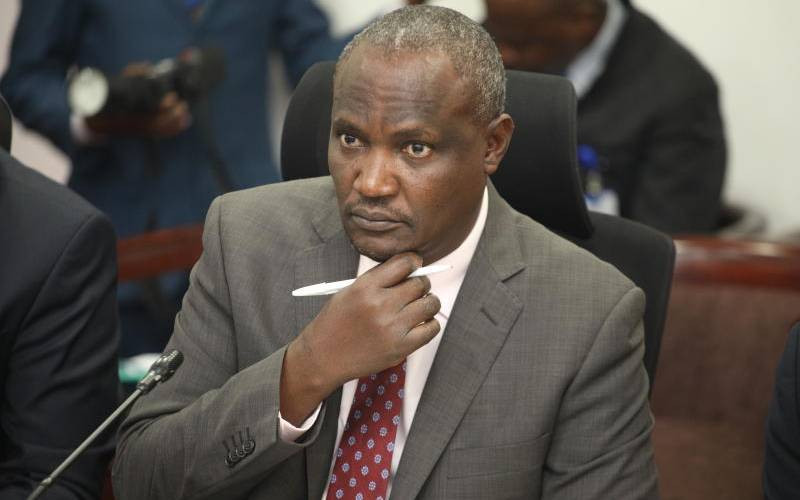Public Investments and Assets Management Principal Secretary Cyrell Odede has confirmed that all ministries, state departments and independent commissions have registration on the e-government procurement system.
The entities, he said, in a circular dated September 1, 2025, have also uploaded their budgets on the e-GP system.
This is even as disquiet intensifies among other government offices, particularly counties, on the rollout of the new system.
Follow The Standard
channel
on WhatsApp
National Treasury Cabinet Secretary John Mbadi has insisted that no government office will be able to procure goods or services outside of the system.
He maintains that the system seeks to “sanitise” government procurement processes, which have been criticised for being opaque.
Service providers are also required to register on the system, which kicked in on July 1 this year.
“The National Treasury hereby confirms that all ministries, state departments and independent commissions and offices have been registered in the e-GP system in readiness for end-to-end electronic processing of procurement of goods, works and services,” said PS Odede in the circular.
He added that as a prerequisite to procurement planning, all state departments, independent commissions and offices’ budgets have also been uploaded to the system.
“The purpose of the circular, therefore, is to request all accounting officers to undertake validation of budgets uploaded in the e-GP platform to ensure that there are no discrepancies between the approved budget and the uploaded budget,” said the PS.
“The validation of the budget shall be carried out for every budget line in the e-GP system, which shall pave the way for procurement planning and other subsequent procurement cycle steps.”
Odede reiterated that the implementation and the use of the e-GP system would result in reduced cost of goods, works and services, besides increasing transparency in the procurement process and practices.
A look at the e-GP platform on Tuesday evening showed 1,420 procuring entities had registered, among them county governments, learning institutions, municipalities, funds, water and sewerage companies. Additionally, some 8,225 suppliers have registered.
Independent Policing Oversight Authority (IPOA) and the Independent Electoral and Boundaries Commission (IEBC) are some of the independent institutions that have already registered.
Other entities that have complied include the Kenya Institute for Public Policy Research and Analysis, the Kenya Institute of Mass Communication, the Competition Authority of Kenya, the Development Bank of Kenya, and Kenya Pipeline Company.
However, county chiefs, through the Council of Governors, have vowed to give the system a wide berth, arguing that it is not working amid threats to withhold funds from the National Treasury.
“Article 62 of our Constitution is not inferior to circulars issued by the National Treasury minister. He cannot threaten us,” said Council of Governors Chairman Ahmed Abdullahi, who is the Wajir Governor.
“The system is not working. No one can shove it down our throats,” he said.
Follow The Standard
channel
on WhatsApp
Public Investments and Assets Management Principal Secretary Cyrell Odede has confirmed that all ministries, state departments and independent commissions have registration on the e-government procurement system.
The entities, he said, in a circular dated September 1, 2025, have also uploaded their budgets on the e-GP system.
This is even as disquiet intensifies among other government offices, particularly counties, on the rollout of the new system.
Follow The Standard
channel
on WhatsApp
National Treasury
Cabinet Secretary John Mbadi has insisted that no government office will be able to procure goods or services outside of the system.
He maintains that the system seeks to “sanitise” government procurement processes, which have been criticised for being opaque.
Service providers are also required to register on the system, which kicked in on July 1 this year.
“The National Treasury hereby confirms that all ministries, state departments and independent commissions and offices have been registered in the e-GP system in readiness for end-to-end electronic processing of procurement of goods, works and services,” said PS Odede in the circular.
He added that as a prerequisite to procurement planning, all state departments, independent commissions and offices’ budgets have also been uploaded to the system.
“The purpose of the circular, therefore, is to request all accounting officers to undertake validation of budgets uploaded in the e-GP platform to ensure that there are no discrepancies between the approved budget and the uploaded budget,” said the PS.
“The validation of the budget shall be carried out for every budget line in the e-GP system, which shall pave the way for procurement planning and other subsequent procurement cycle steps.”
Odede reiterated that the implementation and the use of the e-GP system would result in reduced cost of goods, works and services, besides increasing transparency in the procurement process and practices.
A look at the e-GP
platform on Tuesday evening showed 1,420 procuring entities had registered, among them county governments, learning institutions, municipalities, funds, water and sewerage companies. Additionally, some 8,225 suppliers have registered.
Independent Policing Oversight Authority (IPOA) and the Independent Electoral and Boundaries Commission (IEBC) are some of the independent institutions that have already registered.
Other entities that have complied include the Kenya Institute for Public Policy Research and Analysis, the Kenya Institute of Mass Communication, the Competition Authority of Kenya, the Development Bank of Kenya, and Kenya Pipeline Company.
Stay informed. Subscribe to our newsletter
However, county
chiefs, through the Council of Governors, have vowed to give the system a wide berth, arguing that it is not working amid threats to withhold funds from the National Treasury.
“Article 62 of our Constitution is not inferior to circulars issued by the National Treasury minister. He cannot threaten us,” said Council of Governors Chairman Ahmed Abdullahi, who is the Wajir Governor.
“The system is not working. No one can shove it down our throats,” he said.
Follow The Standard
channel
on WhatsApp
By Graham Kajilwa
